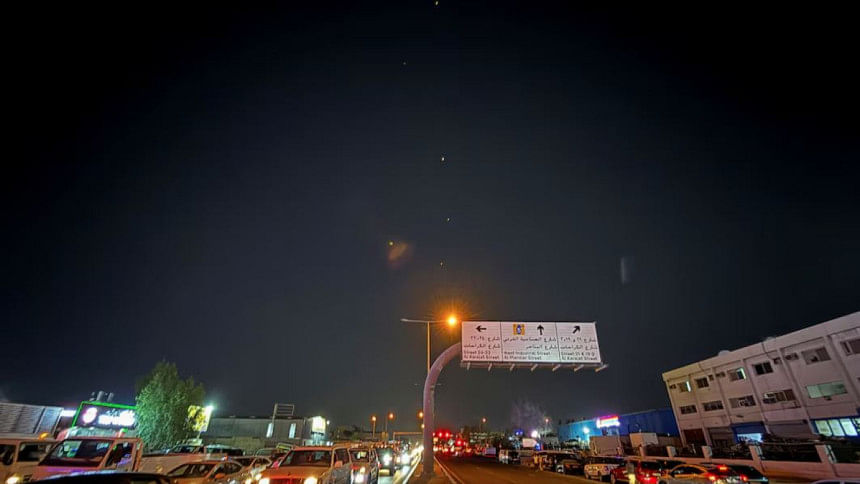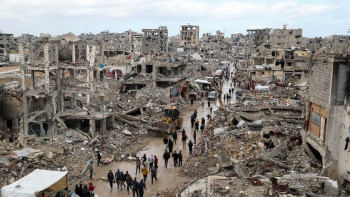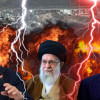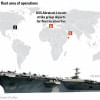Israel, Iran and the US: A game of war and peace

After a historic, unprecedented direct bombing by the US on Iranian nuclear sites, including Fordow, on June 21, the world awaited Iran's response. On June 23, Iran responded by striking the largest US military base in the Middle East, Al-Udeid, in Qatar, with prior warning given to Qatar to minimise casualties. Satellite images captured by Planet Labs, a San Francisco-based Earth imaging company, further corroborated that the base was nearly empty of aircraft ahead of the attack. While the US used Massive Ordnance Penetrator bunker busters and Tomahawk cruise missiles, Iran's reprisal was limited in scope. Trump thanked Iran in a post on Truth Social after the strikes for giving early warning, and hours after, Trump announced a ceasefire between Israel and Iran. The world sitting at the edge of its seat as Iran hit US base, witnessed panic of wider war turn into a path for peace within hours.
Iran's limited retaliation echoes their previous response to the US assassination of Maj Gen Qassim Suleimani in 2020. The country's supreme leader, Ayatollah Ali Khamenei vowed a "forceful revenge." But days later, when Iran fired a series of ballistic missiles at US troops in Iraq, it gave Iraq's prime minister at the time, Adel Abdul Mahfi, prior notice of the impending attack.
But whether the current course of events will follow the course of 2020, cannot be said with certainty.
Iran's retaliation came a day after Trump took a turn from war on Iran's nuclear programme, to confusingly embracing the regime change rhetoric pursued by Israel in its actions. An audio recording obtained by The Washington Post revealed the covert campaign—carried out alongside its strikes—by Israeli intelligence to divide Iranian military officials and push for regime change. The audio recording shows an Israeli intelligence official threatening an unnamed Iranian general on June 13, when Israel began the strikes: "I can advise you now, you have 12 hours to escape with your wife and child." The overall operation, dubbed "Rising Lion" by the Israeli government, relied on the activation of clandestine intelligence teams, pre-positioned weapons caches and other capabilities that had lain dormant inside Iranian territory for weeks or even months, Israeli officials told The Washington Post.
After joining Israel's strikes and directly involving the US, Trump posted on Truth Social on June 22, stating, "It's not politically correct to use the term 'Regime Change." He added, "But if the current Iranian Regime is unable to MAKE IRAN GREAT AGAIN, why wouldn't there be a Regime change??? MIGA!!!" And on June 23 before Iran's airstrikes, Israel did its part, launching strikes not on nuclear or military sites, but on what the Defense Minister Katz called, "government repression bodies in the heart of Tehran." Among the targets was the entrance to Evin Prison, notorious for holding political prisoners and activists who wanted the same Iranian regime change that Israel had been pushing for. Yet, according to Time magazine, a statement—by advocates of a democratic Iran that answers to its people—condemned the attack on Iran and voiced "serious opposition to foreign interference." Twice-jailed Isa Saharkhiz, referring to Israel's military assault said, it's exactly what the hardliners wanted. Trump's withdrawal from Obama's negotiation pact had emboldened Iranian hardliners who in April alone carried out at least 110 executions, and crowded Evin Prison with political prisoners—some of whom were reportedly injured by Israel's strike on the facility.
Since Trump's announcement of a ceasefire with a 24-hour deadline, Israel said it identified missiles launched from Iran in the early morning of June 24 with one slamming into a residential building in the southern region that left three dead. Iranian state media also reported Israel launched fresh attacks on Iran's capital Tehran overnight. The deputy governor of Gilan told Tasnim news agency that Israeli attacks struck homes, causing multiple fatalities. BBC reported nine people died in northern Iran—media outlets and Israel military also mentioned that among those were nuclear scientist Mohammad Reza Sedighi. Iranian state media confirmed that ceasefire has begun, while Iran's Foreign Minister Abbas Araghchi, confirmed on X that, Tehran "has no intention" to continue its response to Israel, provided it "stops its illegal aggression against the Iranian people." Hours later, on June 24, Israel agreed to the ceasefire. Netanyahu claimed to have achieved "all aims" of its campaign against Iran, according to an official statement, which also mentioned that all "imminent threats" of a nuclear Iran have been removed. And nearly minutes after the world breathed a sigh of relief, Israel's Defense Minister Katz announced that Israel had detected Iranian strikes—though it's unclear which strikes he refers to—and said he instructed the Israel Defense Forces to "respond forcefully to Iran's violation of the ceasefire with intense strikes against regime targets in the heart of Tehran." Iranian state media has refuted such allegations, saying that Iran has not violated the ceasefire.
Things are changing rapidly, from extreme war and peace, like a dizzying game of chess. It's unclear what Israel's aims were in the first place—as there was no evidence of "imminent" nuclear threats, and Israel deployed a great deal to weaken the Iranian regime. The exact damages to Iran's nuclear sites, by the US, are also not confirmed. Defense Secretary Pete Hegseth had said that the US bombs "obliterated" Iran's nuclear ambitions, while Joint Chiefs Chairman Gen Dan Caine said that it will "take some time" to assess how much damage has been done. A high-level European weapons systems and ballistics expert told ABC News that it seems "highly unlikely" that the bombs detonated in close vicinity to Fordow's underground structure, based on the calculated performance of the GBU-57, or the "bunker buster" bomb, as the bomb cannot penetrate more than 65 feet while Fordow enrichment site was up to nearly 300 feet beneath the ground.
The exact terms of the ceasefire deal, brokered by Qatar and the US, are not known, so "peace and harmony," as Donald Trump claims, stands on ice. For Iran to come to the negotiating table, a lot more damage has to be repaired. And if the ceasefire has already collapsed, they're back to square one. The tense situation calls into question: can peace be achieved with war in the first place? The past 12 days have significantly blemished international diplomacy and it cannot be fixed within minutes after the full-blown unprecedented violent exchanges within two nations, that have been in a shadow war for over a year.
The Islamic Republic is weakened, but Iran still holds a range of cards in its own target deck. Middle East security expert Burcu Ozcelik at the UK's Royal United Services Institute (RUSI) told CBS News, "Unlike Iran's targeting of Israel, which is far more difficult geographically due to the distance, Iran's stockpile or arsenal of short-range ballistic missiles makes American military installations in the Gulf more vulnerable. They're softer targets in that sense." Iraq, which shares a nearly-1,000 mile porous border with Iran to the east, "tends to be seen as the next potential frontline in where the conflict can escalate," she said, because of "a number of Iran-linked Shia paramilitary groups" that may act independently from the Iranian government. Such groups have in the past attacked the US Al Asad Air Base in Iraq and the US embassy in Baghdad.
Before US airstrikes, Iran had warned Trump that it might activate terrorist "sleeper cells" inside the US if it were attacked, sources said. Major cities in the US remain on high alert. The New York Police Department, the nation's largest municipal police force, issued security advisories and increased patrols around religious, cultural and diplomatic sites the night of US airstrikes. The Department of Homeland Security issued warnings all across the nation. The dangers are high; and each nations' civilians are at risk from further military activity. What remains urgent is a strong call-to-action by the international community to de-escalate; any sort of cessation of violence will likely be temporary.
Ramisa Rob is Geopolitical Insights Editor at The Daily Star.
Views expressed in this article are the author's own.
Follow The Daily Star Opinion on Facebook for the latest opinions, commentaries, and analyses by experts and professionals. To contribute your article or letter to The Daily Star Opinion, see our guidelines for submission.

 For all latest news, follow The Daily Star's Google News channel.
For all latest news, follow The Daily Star's Google News channel. 









Comments